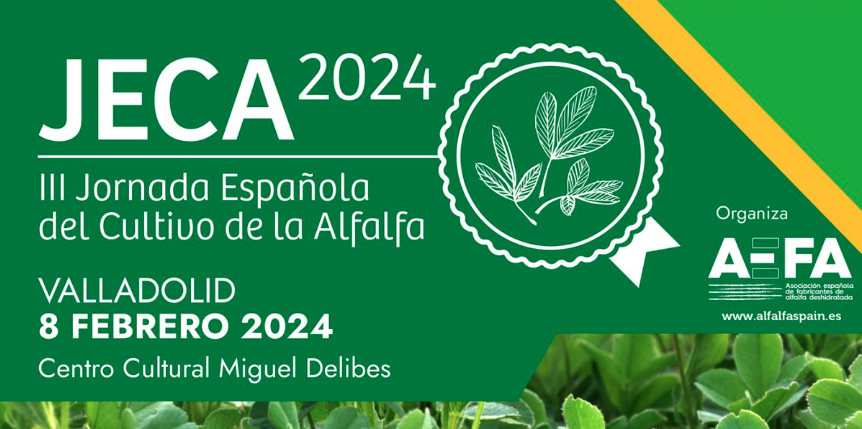
15 Feb Spain, a forage powerhouse in continuous improvement
On February 8, Valladolid became the epicenter of the national debate on the future of alfalfa.
The city of Castilla y León hosted the third National Conference on Alfalfa Cultivation (JECA), which brought together more than 500 producers and experts in this field.
Cristina Vendrell, president of the Spanish Association of Alfalfa Dehydrated Alfalfa Manufacturers (AEFA), opened the conference, stressing the “deep-rootedness” of the dehydration industry, “which fixes the population in rural areas”. This type of crop accounts for a total of 220,000 hectares of surface area and is fundamental in the Spanish trade balance, as pointed out by Paz Fentes, deputy director general of Arable and Industrial Crops and Olive Oil of the Ministry of Agriculture, Fisheries and Food. For his part, the president of the Provincial Council of Valladolid, Conrado Íscar, highlighted Spain’s position as “the third country in the world and first in Europe in fodder production, to whose exports 70% of production is destined”
Miguel Cordoba, CEO of Greenfield Technologies, opened the first part of the presentations by addressing the importance of technology to make forage crops profitable. He was followed by Xavier Pons, professor at the University of Lleida, who described possible measures for pest control. For his part, Jaume Lloveras, also a professor at the University of Lleida, gave the keys to more efficient alfalfa fertilization. Abel Barrios closed the first round of presentations by presenting the study “New crop diversification strategies” of which COFOCYL is a sponsor.
After a short break, it was Marc Piera, founder of CVTona Consultors, who resumed the presentations to analyze the opportunities of using dehydrated alfalfa in cattle feed. He was followed by Pedro Medina, Vice-Minister of Common Agricultural Policy and Rural Development of the Junta de Castilla y León, who analyzed the current impact of the CAP. Argentine researcher Daniel Basigalup explained the importance of using modern alfalfa varieties and their genetic improvement. The use of CRISPR and genomic techniques in Europe, by José Miguel Mulet, Professor of Biotechnology at the Polytechnic University of Valencia, closed the presentations.
The day concluded with a round table discussion in which several experts analyzed the future of the forage sector. The meeting was attended by María Naranjo Crespo from the Ministry, Rafael Rubio Navarro from Forrajes y Proteínas, José Miguel Mulet Salort from the Polytechnic University of Valencia and Felipe Gonzáles, manager of COFOCYL, Compañía Forrajera de Castilla y León.
